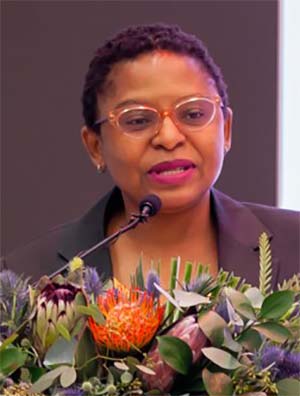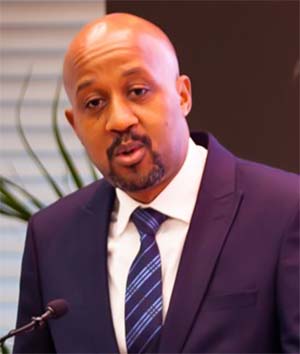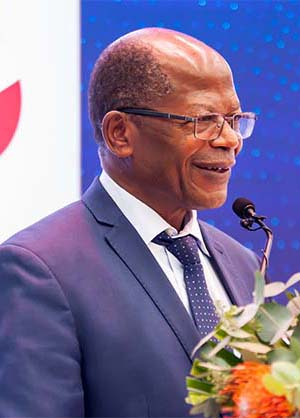Kathy Gibson reports – Huawei has launched the Sub-Saharan Africa Digital Talent Programme, which aims to reach 100 000 candidates over three years.
The company made the announcement on Saturday, 9 April at the 2020/2021 Sub-Saharan Africa ICT Competition Awards ceremony, celebrating winning teams from top performing countries in the region.
More than 15 000 students from over 200 universities and colleges from Sub-Saharan Africa participated in the sixth Annual Huawei ICT Competition (2021-2022).
The competition has been providing students with an international exchange platform to enhance their ICT knowledge, practical abilities, applied skills, and to embrace an innovative mindset since its inception in 2015. It aims to promote the healthy development of Huawei’s ICT talent ecosystem and support the integration of industry and education.
The Huawei ICT Talent platform was created to identify and incubate young ICT talent and organise world-class training opportunities to support the development of the digital economy and address the skills shortage in the sector. Topics covered include 4IR technologies like cloud computing, artificial intelligence, 5G mobile networks and big data.
Students compete in various stages: the National Final is an in-country competition between various institutions; in the Regional Final, national winners compete to advance to next stage; and in the Global Final, regional winners compete for the top accolade.
From the 48 competing teams, Nigerian and Kenyan teams won first prize in the regional final. Teams from Uganda, Ghana, Nigeria, and Tanzania claimed second prize.
“Huawei’s ICT Competition has provided students like me with a network of industry trainers, instructors, and learning tools, allowing us to obtain a competitive advantage and engage with other students on a global stage,” says Ashtone Onyango, a member of the winning Kenyan team. “This is crucial for students as it not only helps them enhance their abilities but also increases their job market competitiveness.”
Digital Talent Program
The Sub-Saharan Africa Digital Talent Programme aims to develop skills in 100 000 people in sub-Saharan Africa over the next three years.

Leo Leo Chen, President of Huawei Southern Africa
Leo Chen, President of Huawei Southern Africa, believes there is a hierarchy of digital skills required in a society: digital leadership, upskilled ICT professionals; empowered youth; and digitally-literate citizens.
“The ICT Talent Programme is a reflection of this hierarchy,” he says, adding that government, academia, and industry have to collaborate if these goals will be achieved.
The programme, dubbed LEAP (leadership, employability, advancement and possibility), aims to encourage leaders in ICT to expose opportunities for themselves, communities and citizens.
“Digitisation is deeply rooted in people. Because we digitise for people and by people. When roots are deep, there is no need to fear the wind,” says Chen. “Through the programme, we strive to cultivate more youth leaders in ICT, who can explore more possibilities for themselves, their families, community and ultimately their nations.”
Over the past two decades, Huawei has helped advance the ICT skills of more than 80 000 people across the region. In doing so, it has helped increase youth employability and bridge the gender gap in the ICT industry. Huawei itself is an employer of choice in the region. Its subsidiaries in nine sub-Saharan African countries earned the Top Employer seal in 2021.
“The programme cannot be achieved by a single role-player on their own,” Chen stresses. “We need close collaboration between government, industry and academia.
“We need to mobilise international expertise and partners; to create an ecosystem where everyone can contribute and everyone can benefit.”
Chen explains that Huawei formulated the LEAP programme based on its own experience in digital development in the region over the last two decades.
“We combined our experience with global best practice, and seized the opportunity brought about by digital transformation on the continent.”
The company has brought together 1 200 trainers with more than 300 academies and institutes, to offer more than 3 000 ICT courses in five catalogues.
The catalogues are leadership, connectivity, cloud and computing, app development, and general courses.
The individual courses cover subjects like digital economy, industry trends, Internet of Things (IoT), 5G, cloud, big data, artificial intelligence (AI), HMS, Python design, security and data analysis.
Training facilities have been established in various locations to ensure as many students as possible are reached, including digitrucks, innovation hubs, training centres, a mirror lab, and the hardware installation base.
“Importantly, we have a clear roadmap to achieve our goals,” Chen concludes.

Khumbudzo Ntshavheni, Minister of Communications and Digital Technologies
Speaking at the ceremony, Khumbudzo Ntshavheni, South African Minister of Communications and Digital Technologies, said: “It takes you, as the LEAP, Seeds of the Future and Huawei ICT Academy Programme participants to leapfrog us into the future. Covid 19 took us into the digital era, but we should not need a pandemic to do this for us in the future, we need to be deliberate and intentional to leapfrog our countries. We need innovation, we need to support local innovators, and we need to promote our own platforms throughout the continent to reach scale and develop our economies. We are only bigger when our market is bigger, and we must walk together.”

Professor Eliamani Sadoyeka, Permanent Secretary, Ministry of Education Science and Technology of Tanzania
Permanent Secretary, Ministry of Education Science and Technology of Tanzania, Professor Eliamani Sadoyeka stresses that the power of ICT should never be underestimated. “ICT has given us almost equal access to knowledge. Once a young mind is connected, a girl from the village in Africa will have the same access to knowledge as a boy in Copenhagen.”
He also touched on the fact that Africa’s future is in the hands of its youth population and urged the students to take full advantage of every learning opportunity. He commended Huawei for its ICT Academy which is giving young people the platform and skills in the latest technologies as well as giving them the opportunity to live up to their fullest potential.

Dr John Chrysestom Muyingo, Ugandan State Minister for Higher Education of Ministry of Education and Sports
Dr John Chrysestom Muyingo, Ugandan State Minister for Higher Education of Ministry of Education and Sports, stated: “We partnered with Huawei on initiatives like the Seeds for the Future, the ICT Competitions through the Huawei ICT Academies established in Uganda and over the years we have always made it a point to play an active role in the implementation of the digital upskilling initiatives in higher education institutions, including universities, across the country. We welcome this partnership, and we are committed to strengthening this relationship.”
The Covid-19 pandemic has spurred the digital adoption across Africa. This increases the demand for more digital skills and talent. According to a World Bank, study on Digital Skills in Sub-Saharan Africa, over 230-million jobs in sub-Saharan Africa will require digital skills by 2030.
That makes programmes like LEAP even more critical. The Huawei ICT Competition is one of the important components of Huawei’s talent development efforts.
Tech4Good
At the event, Huawei also honoured a South African team that placed in the top 10 of the 2021 Tech4Good programme which is focused on getting students to think about how to use technology to address social and environmental issues.
The South African project, called “SA-Tech – South Africa’s Intrusion Detection System”, beat out entries from 79 other countries around the globe and placed in the top 10 alongside those from Argentina, Thailand, Brazil, Iraq, Lebanon, Libya, Poland, Vietnam, and Bangladesh. Additionally, it was placed in the top three in the Tech4Good’s Audience Award, which is voted for by social media users from around the world.
The project itself aims to bring together cameras and motion sensors feeding information into the cloud via TV whitespaces to help detect poachers, who are the biggest threat to South Africa’s critically endangered rhinos. The system is designed to help assist the rangers protect wildlife and help keep them safe day and night.
“My proudest moment was learning that out of the 117 teams from around the world who participated in the Tech4Good challenge, we were part of the top 10 and the only team from the African continent,” said Siyabonga Shandu, who was part of the South Africa intrusion detection system team. “It goes to show we have the capacity and capabilities to create, innovate and build real African solutions to African problems.”
In another local achievement, the South African Public Colleges Organisation (SAPCO) received the 2021 Excellent Global Talent Ecosystem Partner Award.
